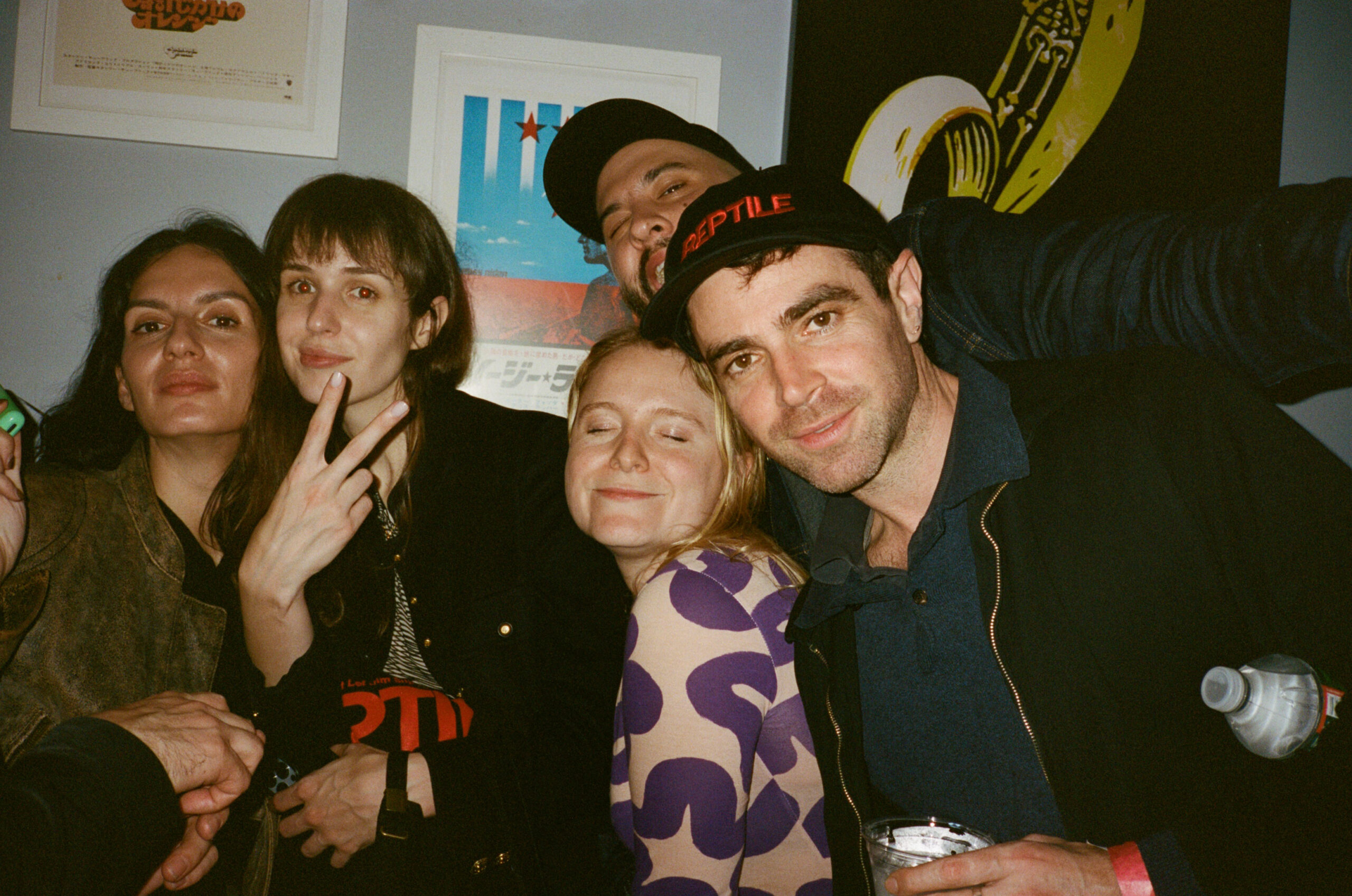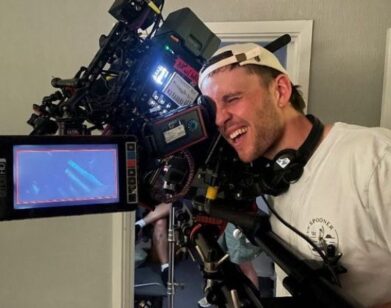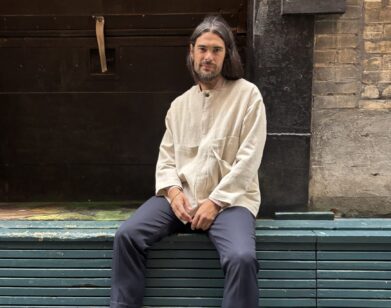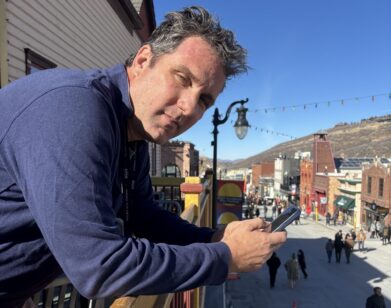DIRECTOR
How Grant Singer Accidentally Made the Biggest Movie in America
Grant Singer has lit people on fire. He’s summoned extraterrestrials, turned bone-breaking dancers into crumbling statues, decapitated them, and birthed children from their gaping necks. He’s pulled people’s faces off to reveal Dennis Rodman, turned pop stars into flocks of crows, and buried their doppelgängers in the desert. Over the course of a career that’s spanned somewhere near 100 music videos, experimental films, live television, concert films, and commercials, he could have gone in any direction for his debut feature film—science fiction, Lynchian horror, or stylized coming-of-age films would all seem to be in his directorial wheelhouse. Instead, he chose the more difficult, and less expected route: a pensive mid-budget detective thriller, the kind of movie that last had its heyday during the 1990s, and the ’70s before that. Now sitting atop the Netflix Global Film Chart for the third consecutive week, Reptile has slithered its way into the psyche of millions, attracting feverish fans and detractors alike, keeping them on edge with an unapologetic embrace of style and an unconventional narrative structure that will keep you guessing—or feeling deceived—until the final frame. Earlier this month, in Los Angeles, I spoke to Singer about why keeping yourself guessing is always the most compelling path forward.
———
PATRIK SANDBERG: I’m happy to be interviewing you, but I don’t have any questions because I already know everything. There’s no mystery with us.
GRANT SINGER: Maybe I should be interviewing you about the movie. [Laughs.]
SANDBERG: How has the experience of this movie been for me?
SINGER: Making this movie, how has it affected you?
SANDBERG: Something you spoke about with the Ion Pack recently was the fact that you could have gone in so many directions for your first feature and no one would have batted an eye. Why did you choose this direction?
SINGER: Oftentimes with music videos, you have to create a spectacle. You have three minutes to draw viewers’ attention and usually you have to make something that’s heightened enough that it matches the energy or the iconic stature of a piece of music. And I think that, first of all, that would be really hard to sustain for two hours unless you’re doing Mad Max. I think it also just comes down to my taste. At the end of the day, I made a movie that I wanted to see. Movies like In The Bedroom or Ordinary People, though not similar to Reptile, have a world and an atmosphere, and that’s something that I wanted to sink into for two hours. Or, like The Conversation or even Vertigo, there is something more classical and traditional. Yes, this is a crime thriller and there is suspense, but it’s set in a very real world with real people that feels lived in and the characters feel three-dimensional, hopefully. I think I was rebelling against a lot of what I had done in my music videos. This film is not a continuation of my work in many ways, but it’s in dialogue with it.
SANDBERG: I think it’s interesting you mentioned In The Bedroom and Ordinary People, because those are family dramas. Reptile is a family drama as well, which isn’t often centered in the conversations about it. The moral fulcrum of the story revolves around [spoiler alert] whether Nichols is willing to essentially betray a member of his family and throw off the entire dynamic of his life.
SINGER: That’s the predicament of the second half of the film. It’s like, “Is he going to do the right thing or not?” If, by doing the right thing, he’s also sacrificing his relationship with his wife, or his relationship with her uncle. He’s in this new home in this new city, and has this brotherhood. It’s similar to Rosemary’s Baby, with what happens to Mia Farrow. I don’t know if that was a conscious thing. It was more about Americana and the film having a timelessness to it.
SANDBERG: Something I’ve seen people say to you over and over is that they can’t believe it’s your first feature, given the aptitude and execution. Your directing has a confidence we don’t often see. When you were writing the movie, were you aware you were taking a big swing?
SINGER: The funny thing is that I kind of thought this was a small, contained movie. It wasn’t until we had the first cut and I started showing it to people and seeing the reactions that I realized it was ambitious, or that the scope of it was bigger than I realized. Even when I was making it, I wasn’t conscious of it. You’re biting off little pieces at a time. If you look at the whole meal, it’s like, “Whoa, I just ate the entire contents of the fridge.” But it’s happening one bite at a time and all you’re focused on is making that shot great. I’m still not able to see it the way you see it because I made it. I even think I could have taken a bigger swing. But what I was really trying to do was to evoke this feeling of being deceived. I wanted to make a movie that was very mechanical and precise and razor-sharp in its construction but anchored in classical filmmaking.
SANDBERG: It’s an interesting argument for form because the style of directing can go a long way toward making a movie feel, for lack of a better term, more expensive. That’s something to consider, especially for directors who are hoping to make their first films.
SINGER: Exactly, and things that probably feel big to other people are so grounded and simple to me, like a simple pan, right? Or a beautiful dolly shot. That might feel gigantic to someone. It’s actually not expensive. It’s more about taking real consideration and planning.
SANDBERG: We’ve seen a lot of handheld the past few years.
SINGER: At the time I made the movie, I was very interested in doing things that were very classical. I wanted the movie to feel like it could have taken place in a different decade or now. I’m a student of film and I love film from all different decades. I love movies from the seventies, the fifties and the early sixties. So it was a chance for me to employ certain things I think of as timeless and more honest. But there are also things that are modern. It’s really a culmination of my taste from my entire life.
SANDBERG: Relatability has become such an interesting mandate because people tend to find one way into it, like including blunt references to popular culture, or current technologies, or overused slang terms. But I actually think your approach is equally relatable.
SINGER: A lot of it was intuitive and happening in the moment as well. You see something in the shot you don’t like, or doesn’t fit with how you see the shot, you take it out.
SANDBERG: This being your first feature, was there any point, either before, during, or after production, that really surprised the fuck out of you? Or a point when you started feeling the pressure?
SINGER: About two weeks before shooting. We only had six weeks of hard prep on the ground in Atlanta, so that’s not a lot of time for a movie of this size. Also, the casting getting locked up. But once Netflix came on board, I think there was a new pressure in realizing that a lot of people are going to see the movie. There is a conscious and a subconscious effect, of, like, “Fuck, this movie has to work for so many people.” Even last night, I went to the Yves Tumor concert, and I’m like, “these are my people.” It gives me hope for future generations that young people are cool again. Aesthetically, I’m more comfortable in a place like Das Bunker, or some weird dive bar in the middle of nowhere. But I knew I had to make something that was a little more broad—and Netflix is so broad. But I think the reason the movie works is because I am fringey and my tastes are more alternative. Like, when you look at Luca Guadagnino, for example, who I love, he’s also kind of alternative and has really artistic sensibilities but when he makes a very straightforward or traditional movie, like Call Me By Your Name, that combination ends up being beautiful.
SANDBERG: It’s more infused with idiosyncrasy on some level. It’s straightforward, but not generic.
SINGER: The shots in the corridor, the static shots of interiors, are just incredible and without an artful lens you would never shoot a movie like that, ever. You know what I mean? But that’s him and it’s his artfulness that penetrates throughout the movie.
SANDBERG: You’ve directed so many types of things. Was there a specific aspect to feature-length filmmaking that struck you as particularly new?
SINGER: Two things. One is just how many fucking times you to watch the movie. I’ve probably seen it 750 times. Okay? So you watch it that many times and you have to find new ways to endure your own movie. You know something is working when you realize you have no more complaints. I’m usually like, “That makes me cringe. I don’t like that. Take that out. This could be a bit smoother.” Once you have no more comments, that’s when you’re like, “Okay, this is actually feeling really good.” The other thing for me was just the relentlessness of it. When you’re shooting a movie it’s fifty-something days. A music video is often one day, two or three days max. With this, every day is just a marathon. You’re away from your family and your friends. I wasn’t communicating with anyone in my life. I was so immersed in this thing it felt like I was overseas in some distant land, like in Apocalypse Now. You have to access a different part of yourself where you just get through it. Also, it being my first film, I wanted it to be good so fucking bad I wasn’t going to distract myself with anything.
SANDBERG: Well, that seems to have paid off because as of this interview it’s been the number one film globally on Netflix for three weeks, which I’m told is rather unheard of. Did you expect this?
SINGER: No, I did not. Even a month ago, I didn’t understand. I would just go on Netflix and think people are going to see it, but I didn’t think of how many people. On opening weekend, the movie came out and I was getting messages in languages I don’t understand, and the response was so overwhelming, that was the moment I was able to begin to grasp the global impact you have at a company like Netflix. But the biggest thing for me has been the way people totally disconnected from me are telling me how much the movie moved them. If I could make something that affects a total stranger like that, I feel like now I’m connected to this stranger. That, to me, is really cool.
SANDBERG: Mid-budget thrillers are back. Also, Alicia Silverstone is back. I noticed she was number one on IMDb’s StarMeter. How does it feel to play a part in an Aliciassaince?
SINGER: It’s amazing and surreal. I remember seeing Clueless in the theater as a kid. I was in row three on the far right. I have a very distinct memory of watching that movie in the theater. And I understood immediately, and you understand this, that it was one of the most iconic movies of the 90s, along with Pulp Fiction and Boogie Nights.
SANDBERG: It pervades my psychology so deeply to this day that I just bought a fucking Jeep!
SINGER: [Laughs] Casting Alicia was very meaningful for me, and it was meaningful for Benicio [Del Toro] too because they had worked together so long before then [in Excess Baggage]. It’s similar to me putting Sky [Ferreira] in the movie. It was a full-circle moment because on day one. I got to set and I’m shooting a scene with Sky and Benicio and Ato [Essandoh] in the dive bar. It was so cool because I started my career making music videos with Sky. These relationships make the whole experience more meaningful. It makes things more interesting, but it’s also emotional.
SANDBERG: The whole cast feels like a series of inspiring choices, like playing Justin Timberlake opposite Michael Pitt.
SINGER: It’s like Celebrity Death Match.
SANDBERG: Somehow, it makes sense in the Grant Singer universe.
SINGER: I like counterpoints, I don’t like things that are too vanilla. I like things that are more piercing, that have sharp edges, and I think the casting demonstrates that.
SANDBERG: When the pandemic hit, it played a role in allowing you and Benicio to work together and to really flesh out this character, which led to him rewriting the movie with you. What was it like working with him on a day-to-day basis and having to act across from him in script readings?
SINGER: I was just like, “I don’t want to fuck this up.” That experience was totally surreal at the time because I had just watched Escape at Dannemora and his performance penetrates so deeply, and it’s so mesmerizing and magnetic and has so much conviction. So I had just seen that and then I started working with him and I’m sitting across from him at this table and we’re just getting to know each other and talking about our lives, our tastes, movies, really anything. The only acting I had ever done was at a kid’s theater camp, I played Toto in The Wiz. This was in 1996. My grandfather goes, “Grant, I think maybe you should be an actor.” And I was like, “Really?” So I enrolled in an acting summer camp. Maybe two or three days before the big performance, my grandfather died of a heart attack. I remember already not wanting to go on stage. I had only done this for my grandfather and he’s no longer there. It was so uncomfortable—it was almost like a Todd Solondz tone, I’m woofing and barking on stage and it’s so embarrassing. I’ll never forget it. After that day, I never acted again. So I’m sitting with Benicio and he goes “Let’s do the scene.” I’m thinking, “Holy fuck. I’m going to have to act against Benicio Del Toro and the last time I acted I was barking on stage as a kid.”
SANDBERG: And Benicio’s performance in the film is so calibrated and intense.
SINGER: He’s intimidating as an actor. I have so much respect for actors who work with him because there is such an intensity when he is performing. It actually brings a level of seriousness to the set. When he walks on set, it becomes, “Okay, this is business. This is serious. We’re making a movie but we’re not here to fuck around.”
SANDBERG: Everybody rises to his level. The success of the movie has brought a lot of things your way. Has it changed your idea of the kind of movie you want to do next?
SINGER: I know that I am very interested in characters that are very alive and unpredictable, wild and contradictory, three-dimensional, and worlds that are very encompassing, vivid, and true to life. I want to make things that are honest but also intense. Wild, beautiful, incredible characters in stories that are moving and emotional. I think that’s definitely the plan.







